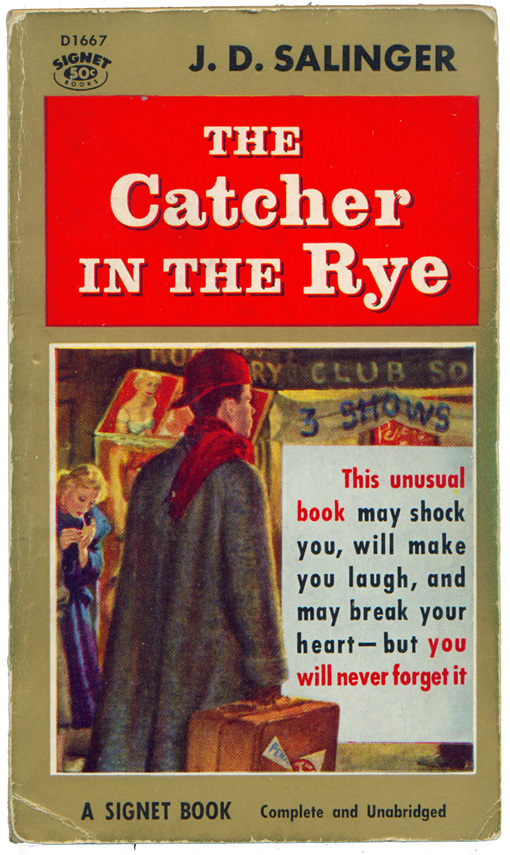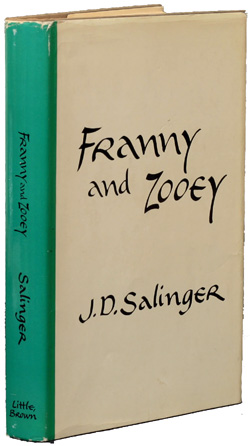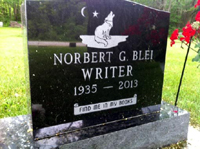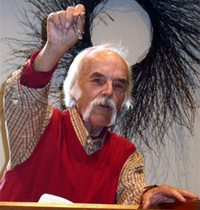
NOTES from the UNDERGROUND # 207 | February 3, 2010
J.D. Salinger
1919-2010
I’ve been mulling this over since his death last week, January 27th at the age of 91. Here’s where I am ‘at the moment.’ The beginning and end of it all.
At a certain point in his life (the revolutionary 1960’s, as a matter of fact), Salinger reads the American landscape (what the 60’s and 70’s were about—and even before that, in the 50’s) and like a number of American writers then (the Beats), before then (the Transcendentalists), up to the very present, (Pound, W.C. Williams, etc. somewhere in between), Salinger turns his attention (addresses his psyche?) East.
He’s half Jewish, with little spirit of Judaism directing him, so it seems). Instead, Buddhism calls…he turns East… and begins to explore his way then and there / here and now.
This is stuff best left to future Salinger scholars, nevertheless has been gnawing at me the past few days, worth speculating upon, especially if you were a fledgling writer, part or on the edge of that time in this culture, (attempting to understand the Zen concept of nothing being everything)…trying to find your own way through the maze of literary forms, literary history…who’s saying or said what, when, and how?…and suddenly your hear Holden calling, coming through the rye.
Back to early Salinger. He’s a ‘born writer’ writer, a given from early youth, high schoolish attempts to put the word down. He gets himself some higher education—no degree. Takes a night course in writing (Columbia University …1939) from Whit Burnett (Story magazine). Lands a story there in 1940. Then tries his luck at The New Yorker in 1941, receiving 7 rejections in a row that year. Though, eventually, lands one (same year…or ‘42)—which takes almost five years to see print. (One of the characters in his early stories is named Holden. Hmmm…). At which point (somewhere around there) he is drafted into the Army. Sees some action. Normandy? Meets Hemingway (receives his blessing.) Comes back—an authentic American vet. (Rite-of-passage, WAR–though he doesn’t write about it in the usual Hemingway, Mailer, Jones, etc. American way, but in a most Salingeresque way, “For Esme’—with Love and Squalor”) By now he’s got a real taste of it all. Everything. Gotten his feet wet in the American short story, tested the waters of literati New York. And goes through the traditional writer’s plot of marriage, divorce, family, work, art, desire, silence, spirit…the unrecorded living novel called daily life.
He hits with THE CATCHER IN THE RYE in 1951 and everything is new and old history from this point on. (He can live rent-free the rest of his life on this book alone—though, of course, he doesn’t know it at the time.) But it grows on him. It all grows on him. And ‘for whom the bell tolls’ eventually begins tolling for him, in his own mind. Success spells D E A T H. He’s begun to care less. Understand silence. He just wants to write. More. Be left alone. “Glass.” He sees through the American dream. Innocence, where art thou? Why hast thou forsaken me?
Innocence–thy name is Phoebe. “If you want to know the truth.” (CATCHER, 1951)
Two years later he hits with the collection: NINE STORIES (1953). It’s all there. Everything else you may need to know about Salinger. For the epigram to this work he has chosen some old, familiar Eastern words:
We know the sound of two hands clapping.
But what is the sound of one hand clapping?
–A Zen Koan
Eight years later (1963) he publishes FRANNY & ZOOEY. His third book, second story collection. He will publish only one more in 1963, (a lifetime achievement of only four books), RAISE HIGH THE ROOFBEAM, CARPENTERS and SEYMOUR, AN INTRODUCTION.
 And ‘see more’ we do. Glass or no glass. Here’s an excerpt from “Franny”:
And ‘see more’ we do. Glass or no glass. Here’s an excerpt from “Franny”:
“Well, as I said, the pilgrim — this simple peasant-started the whole pilgrimage to find out what it means in the Bible when it says you’re supposed to pray without ceasing. And then he meets this starets — this very advanced religious person I mentioned, the one who’d been studying the Philokalia for years and years and years.” Franny stopped suddenly to reflect, to organize. “Well, the starets tells him about the Jesus Prayer first of all. “Lord Jesus Christ, have mercy on me.’ I mean that’s what it is. And he explains to him that those are the best words to use when you pray. Especially the word ‘mercy,’ because it’s such a really enormous word and can mean so many things. I mean it doesn’t just have to mean mercy.” Franny paused to reflect again. She was no longer looking at Lane’s plate but over his shoulder. “Anyway,” she went on, “the starets tells the pilgrim that if you keep saying that prayer over and over again — you only have to just do it with your lips at first — then eventually what happens, the prayer becomes self-active. Something happens after a while. I don’t know what, but something happens, and the words get synchronized with the person’s heartbeats, and then you’re actually praying without ceasing. Which has a really tremendous, mystical effect on your whole outlook. I mean that’s the whole point of it, more or less. I mean you do it to purify your whole outlook and get an absolutely new conception of what everything’s about.” …
“But the thing is, the marvelous thing is, when you first start doing it, you don’t even have to have faith in what you’re doing. I mean even if you’re terribly embarrassed about the whole thing, it’s perfectly all right. I mean you’re not insulting anybody or anything. In other words, nobody asks you to believe a single thing when you first start out. You don’t even have to think about what you’re saying, the starets said. All you have to have in the beginning is quantity. Then, later on, it becomes quality by itself. On its own power or something. He says that any name of God—any name at all — has this peculiar, self-active power of its own, and it starts working after you’ve sort of started it up.” …
“As a matter of fact, that makes absolute sense,” Franny said, “because in the Nembutsu sects of Buddhism, people keep saying ‘Namu Amida Butsii over and over again — which means ‘Praises to the Buddha or something like that — and the same thing happens. The exact same —” …
Franny gave a minimal glance down at her left hand, and dropped the stub of her still burning cigarette into the ashtray. “The same thing happens in ‘The Cloud of Unknowing,” too. Just with the word ‘God.’ I mean you just keep saying the word ‘God.'” She looked at Lane more directly than she had in several minutes. “I mean the point is did you ever hear anything so fascinating in your life, in a way? I mean it’s so hard to just say it’s absolute coincidence and then just let it go at that— that’s what’s so fascinating to me. At least, that’s what’s so terribly —”…
…”I didn’t say I believed it or I didn’t believe it,” … “I said it was fascinating.” …”I just think it’s a terribly peculiar coincidence, that you keep running into that kind of advice—I mean all these really advanced and absolutely unbogus religious persons that keep telling you if you repeat the name of God incessantly, something happens. Even in India. In India, they tell you to meditate on the ‘Om,’ which means the same thing, really, and the exact same result is supposed to happen. So I mean you can’t just rationalize it away without even —” …
“You get to see God. Something happens in some absolutely nonphysical part of the heart—where the Hindus say that Atman resides, if you ever took any Religion — and you see God, that’s all.” …
[from: FRANNY AND ZOOEY (1961)]

In the vein of old Zen lingo (which I’ve been know to speak myself at times): “There is nothing to say and I am saying it…”
Including this, ‘in the beginning’:
Melville began with “Call me Ishmael”…Tried and true. Damn right biblical, in his life and times.
Twain raised the vernacular American voice to perfect pitch: “You don’t know about me without you have read a book by the name of The Adventures of Tom Sawyer; but that ain’t no matter. That book was made by Mr. Mark Twain, and he told the truth, mainly.”
Salinger spoke, speaks to us still: “If you really want to hear about it, the first thing you’ll probably want to know is where I was born, and what my lousy childhood was like, and how my parents were occupied and all before they had me, and all that David Copperfield kind of crap, but I don’t feel like going into it, if you want to know the truth.”
And that’s the literary truth. The sound of one hand clapping. —norbert blei



























































Thanks for this insight, Norb. I’ve read Salinger and keep going back re-reading. I wonder when the hidden, unpublished books will appear. Yeah, I’m going to read them. -Gar
Nice piece. Now I know why they call it “getting the clap.”
I still have the copy I read in high school > I swear I knew this dude and, as did everyone else apparently: dug ‘im. But I was not aware of all of the above ~ once again, you’ve turned the light on. My “Read” list has just grown by four … oy!
(thanks-always, NorbertO).
JACK KEROUAC, 1949 Journal Entry–“I thank you, God, with all of my heart, for this undeserved good fortune…coming years after I prayed for it to you. Now I see that all good luck and all bad luck are unintended by you; that it is Something Else you wish to reveal…and that is, humility and care wherever & whenever, whatever & whichevers and what-all, on Earth. Teach me to see. Teach me to pray. God preserve my Want of your mysterious wishes. Don’t frighten me with gratuitous heapings of good fortune, as I have been needlessy frightened by the bad. Teach me no Fear of you, but Understanding of your mysterious wishes, so I may Comply. (And God is the only critic who cares little for style, eh?) A WRITING RULE–No need to create effects, as in recreating atmosphere, when these mere effects come naturally (as in life) as a result of desired events. Thus, write as you might live.”
“Unusual book…..you will never forget it.” Indeed.
Now comes a good part. The overlays of the biographs that will flow. The New Yorker in the front ranks in current issue with a memory of Lillian Ross.
Your summation as generated by your initial thoughts, as you allow, was terrific.
Thanks to the Ellison Bay coop occupant! I will forward it to several.
when catcher came out, i told my did to read it. he was a lutheran pastor. of firm attitude. he read it. here is his literary criticism:
“It’s the case history of a creep.”
Oh, well…..
sdf
When I was writing my first published pieces for a local newspaper,
the editor took enough interest in me to provide me with Catcher, To Esme with
Love, Franny and Zooey and Nine Stories. You have inspired me to dig them out
and reread them with new wisdom now. What I remember most was a passage where Seymour (think it was Seymour) said that the child he was taking care of,
the highchair, the glass of milk, the milk itself were all God. Everything was God.
It summed up what was happening to Salinger himself. And then…
Salinger disappeared. He wrote no more. He found a safehold from all publicity.
I mentioned Salinger once to Dale Wasserman, the playwrite who created
One Flew Over the Cuckoo’s Nest and other broadway plays, when he was
teaching at Rhinelander. He laughed and said he had had lunch with Salinger
not long before and “Salinger is fine. He has learned not to need anything
anymore.” Not to need anything anymore while one is still living sounds both
fine and terrible.
Thanks Norb for your insights and revelations. Fiercely relevant and expressed splendidly.